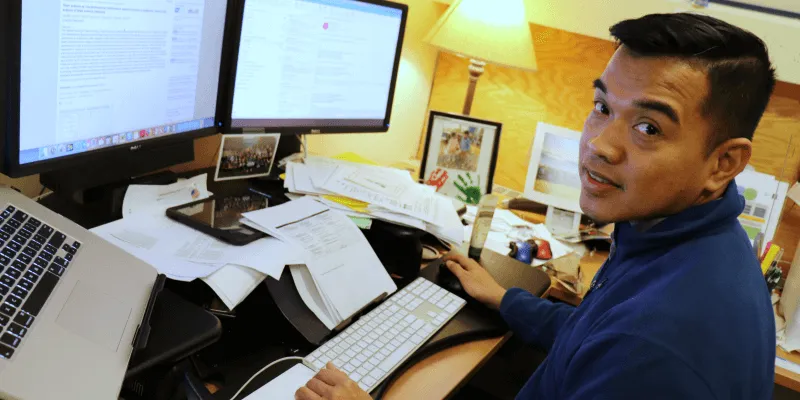Team science -- collaborative, interdisciplinary and interprofessional efforts to solve complex problems – is the topic of a January 31 presentation at The Teaching Academy, an initiative of the Larner College of Medicine. Rehabilitation and Movement Science Professor Reuben Escorpizo and Dietetics Lecturer Amy Nickerson will introduce the principles of Team Science and describe its value in the context of interprofessional education and collaborative practice.
CNHS faculty and students are encouraged to attend this free presentation at the Medical Education center, by reservation, with lunch provided. The event is part of a series of “lunch and learn” programs developed by Nursing Professor Nancy Lemieux, interim Co-Director of Interprofessional Education at CNHS with Communication Sciences and Disorders Professor Danra Kazenski.
Team science engages people from various fields working collaboratively toward the resolution of complex, multi-factorial problems, such as the rise of chronic disease or the health impacts of social stratification. Collaborative groups may include community members and policy makers along with researchers. Through the process of sharing and expanding domains of expertise, research endeavors possess greater potential for advancing science toward achieving desired outcomes.
Escorpizo, Nickerson and Professor Mary Val Palumbo, CNHS Director of Interprofessional Education, attended an intensive workshop last summer to advance their team science understanding and develop a course for teaching interprofessional inquiry skills to students pursuing degrees in physical therapy, nursing, communication sciences and disorders, biomedical and health sciences and dietetics. That course, Fundamentals of Critical Inquiry, commenced spring semester 2019.
For Teaching Academy participants, Escorpizo and Nickerson will describe the principles and benefits of team science and the challenges that team face.
“There is evidence that team science contributes to better health outcomes than efforts that don’t include team science. But working collaboratively across disciplines and professions to address a problem can be incredibly challenging,” Escorpizo said. “We’ll talk about team dynamics, the impact of personal and social styles on teamwork, managing conflict within the team and the process of giving and receiving feedback.”
Lemieux arranged this event in her role as Visiting Faculty Scholar in The Teaching Academy.
“My position’s focus is to foster interprofessional education collaboration among the health profession programs at UVM,” Lemieux said. This includes facilitating faculty development for interprofessional education and coaching faculty in creating interprofessional education materials. Professer Lemieux’s expertise includes interprofessional education and collaborative practice. She serves as the Department of Nursing’s Director of Simulation Education and a member of the UVM Clinical Simulation Laboratory Operations Team. As interim Co-Director of Interprofessional Education at CNHS, Lemieux plans interprofessional activities for students and faculty to learn with, from and about one another, with the goal of creating a culture of knowledge sharing that best serves patients.
To RSVP for the January 31 Lunch and Learn, contact Amanda Broder, Amanda.Broder@med.uvm.edu.
